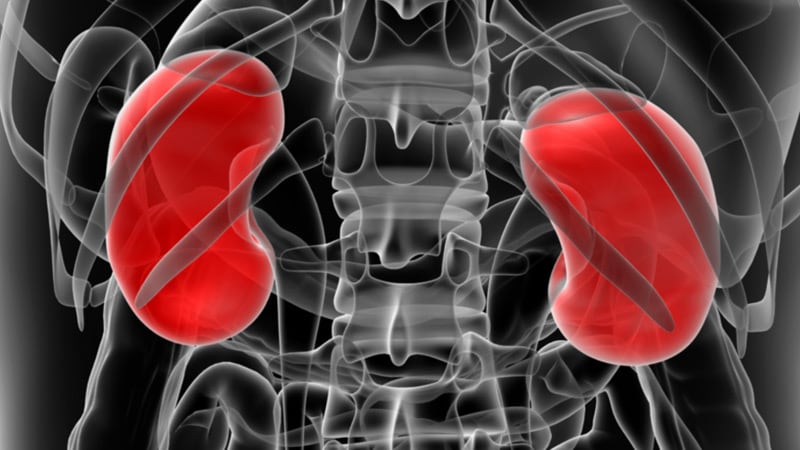Adverse Events Linked to Modest Kidney Function Declines
Основні поняття
Modest reductions in kidney function, especially in younger adults, are associated with a heightened risk of adverse events, emphasizing the importance of monitoring and preventive measures.
Анотація
The content discusses a study linking modest reductions in kidney function to a 42% increased risk of all-cause mortality, cardiovascular events, and kidney failure in adults under 40. The study, published in The BMJ, analyzed data from almost 9 million participants in Ontario, highlighting the significance of monitoring kidney function, particularly in young individuals. Key insights include the impact of age-specific eGFR thresholds, the increased risk of adverse outcomes in younger patients, and the importance of preventive measures to reduce cardiovascular risk and kidney disease progression.
Налаштувати зведення
Переписати за допомогою ШІ
Згенерувати цитати
Перекласти джерело
Іншою мовою
Згенерувати інтелект-карту
із вихідного контенту
Перейти до джерела
www.medscape.com
Modest Declines in Kidney Function Linked to Adverse Events
Статистика
Modest reductions in estimated glomerular filtration rate (eGFR) were associated with a 42% increased risk of adverse events in adults under 40.
The study included data from 8,703,871 adults in Ontario, with a mean age of 41.3 years and a median follow-up duration of 9.2 years.
For participants aged 18–39 years, the hazard ratio (HR) of adverse outcomes for modest reductions in eGFR was 1.42.
Цитати
"If we want to prevent future kidney disease, if we want to prevent heart disease, we have to pay attention to these slight decreases in kidney function in young people." - Dr. Manish M. Sood
"The risk was always there. Our study was huge, and we really looked in detail, by little increments of 10%, at young people and found this increased risk." - Dr. Manish M. Sood
"This study reminds us to be aware and monitor our patients." - Dr. Jia Hwei Ng
Ключові висновки, отримані з
by Fran Lowry о www.medscape.com 06-29-2023
https://www.medscape.com/viewarticle/993876
Глибші Запити
What are the potential implications of early monitoring and intervention in individuals with modest reductions in kidney function?
Early monitoring and intervention in individuals with modest reductions in kidney function can have significant implications for their long-term health outcomes. By detecting these slight decreases in kidney function early on, healthcare providers can implement strategies to prevent the progression of kidney disease and reduce the risk of adverse events such as cardiovascular disease and kidney failure. Monitoring these individuals closely allows for timely interventions, such as lifestyle modifications, medication management, and regular follow-up appointments, which can help slow down the progression of chronic kidney disease (CKD) and improve overall outcomes. Additionally, early intervention can lead to better patient education on the importance of maintaining kidney health, promoting healthier lifestyle choices, and potentially preventing the need for more invasive treatments like dialysis or kidney transplants in the future.
Is there a need for revised guidelines on kidney function assessment, especially in younger adults?
The findings of the study suggest that there may be a need for revised guidelines on kidney function assessment, particularly in younger adults. Current guidelines for diagnosing CKD are based on a threshold of estimated glomerular filtration rate (eGFR) <60 mL/min/1.73 m2 for at least 90 days, which may not capture early declines in kidney function among younger individuals. Given that modest reductions in eGFR in younger adults were associated with a heightened risk of adverse events, including all-cause mortality, cardiovascular events, and kidney failure, it may be beneficial to consider lowering the threshold for diagnosing CKD in this age group. Revised guidelines could help healthcare providers identify at-risk individuals earlier, leading to more proactive monitoring, interventions, and preventive measures to improve outcomes and reduce the burden of kidney disease in younger populations.
How can the findings of this study impact public health policies regarding kidney disease prevention and management?
The findings of this study have the potential to significantly impact public health policies regarding kidney disease prevention and management. By demonstrating the increased risk of adverse outcomes associated with modest reductions in kidney function, especially in younger adults, this research highlights the importance of early detection and intervention in kidney disease. Public health policies can be informed by these findings to prioritize kidney health screening, education, and awareness campaigns targeting at-risk populations, including younger adults with slight decreases in eGFR. Policies focused on promoting healthy lifestyle behaviors, regular kidney function monitoring, and access to preventive care services can help reduce the incidence and progression of kidney disease, ultimately leading to improved population health outcomes and reduced healthcare costs associated with advanced kidney disease management. By integrating these research findings into public health strategies, policymakers can work towards addressing the growing burden of kidney disease and its associated complications on a broader scale.
0
